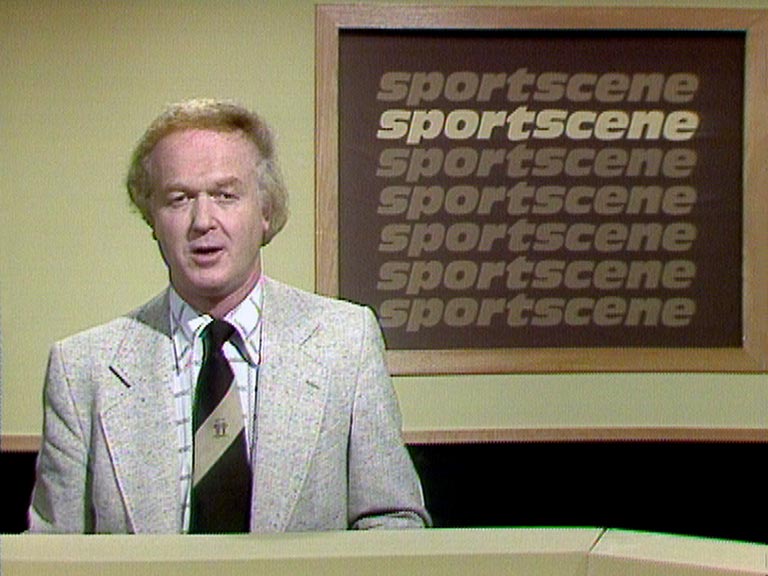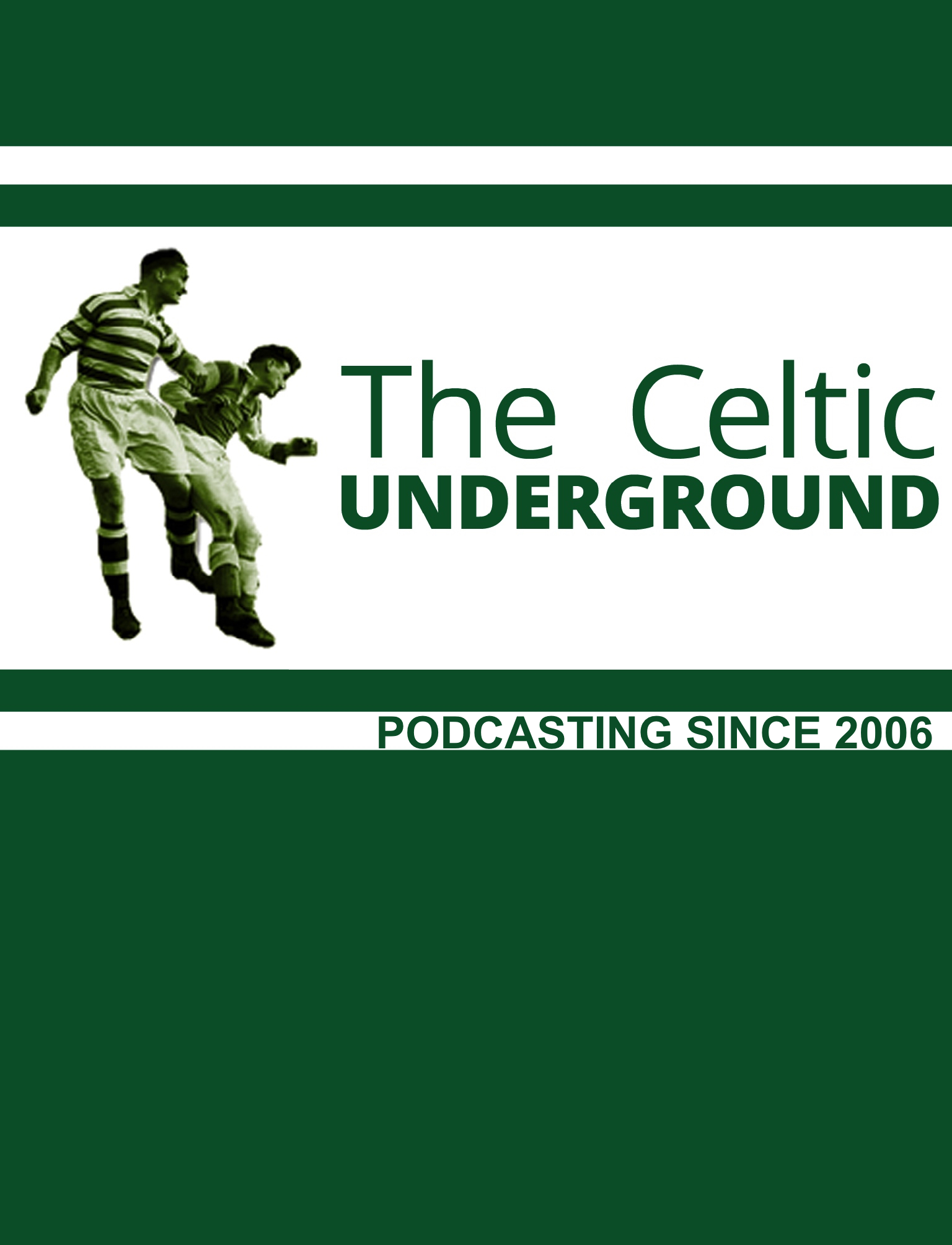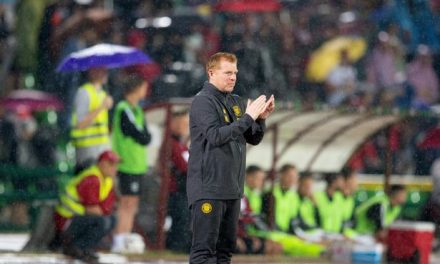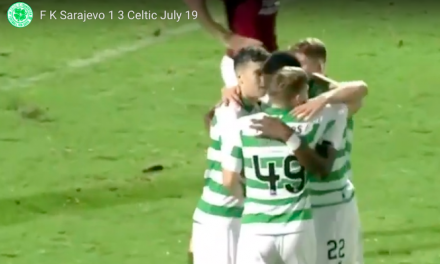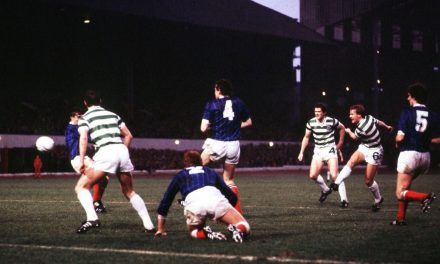Archie McPherson is a Scottish football institution. As journalist, broadcaster, and commentator, he has witnessed the ups and downs of Scottish football for over 60 years. In this interview with St Anthony, Archie reminisces on his career observing Scottish football and the main characters he has encountered.
What’s the first football match you can recall and who was your first football hero?
I was brought up in the east end of Glasgow in Shettleston and my father had played for Shettleston juniors so I was taken along to see them, but not to see him as he had stopped playing by that stage. I lived in 771 Shettleston Road and I remember being taken by an uncle. There were no turnstiles but if you bent low enough you could get in without anyone actually seeing you. I have a firm recollection of one of the most famous men in Scottish football making his debut at Greenfield Park in Shettleston and he lived not very far from where I was born in the Bowry. He only played about 6 games for Shettleston before was signed by Celtic and that was Tommy Docherty. So I watched ‘The Doc’ make his debut in Greenfield Park. I admired a man who never really made his name in Scottish football, a guy called ‘Doc’ McManus. He was an inside forward for Shettleston juniors and his belly preceded him. You felt as if he must train in the local pub. However, he was very deceptive and was a traditional Scottish inside forward. He had long straggly, curly hair and was magnificent on the ball although he had no pace and no energy. He manipulated the ball well, he was brilliant. So these were my earliest recollections.
You were a teacher, a headmaster actually, so how did you become a television presenter?
Well, it’s a complicated story because when I was a teacher I wasn’t very well paid and I thought I’d better start doing something more creative with my life. So I started to write short stories for different publications. As James Thurber once said – ‘The rejection slips came back ling ping-pong balls from the other side of the net’ – and I was rejected over and over again. But one day I picked up an early edition of the Evening Times, when I was teaching in Glenboig, and I saw my story in the Times. In those days I didn’t want anyone to know I was moonlighting by writing stories so I took the pen name of Alan Marshall as it was my own initials of A.M. I’ve been to umpteen World Cups, European games, cup finals but nothing equals seeing your first work in public, seeing something you have worked on actually being printed. I continued to write until the BBC accepted a short story from me. The producer was a man called Jimmy Crampsey, who was Bob Crampsey’s uncle. He liked it and he broadcast it although I didn’t particularly like the way it was read, so I had the audacity to ask him for the next one if I could read it myself. He agreed and I went for a cup of tea and met some folk from the BBC sports department. They knew I’d played amateur football with Queens Park at one stage and they said they had been listening to me and would I like to do some sports reporting. So, it was writing a short story which was to give me my first step in to the BBC. The first game I did was only about 10 minutes away from where we are sitting now, at Hamilton Accies ground, Douglas Park. It was the time of the ‘Cuban crisis’ between the USA and Russia. I was on the bus as Soviet ships were steaming for Cuba and I thought God only knows what was going to happen. And what did I have to soothe me and calm me? Hamilton Accies versus Stenhousmuir! I got through that then did a report for the Eamon Andrews programme. He was the guy who did ‘This is your Life’ on TV but he did sport before that. I started in radio then progressed to television and then they asked me to do a commentary. My first one was Third Lanark versus Hibs, which would have been around 1964.
At that time in the BBC, and you have documented this in your book, Jock Stein felt there was a bit of bias in the BBC against Celtic. Is that correct?
Oh yes, I have written about this very clearly, there were one or two people within the BBC who didn’t like Celtic. It was subtle, but it was there and Stein realised that. Jock was the man who got in everywhere and listened to everybody. People would tell him things and he realised that. There was a great deal of animosity until I went out to see him at Celtic Park and stood in the boardroom with him. I said I agreed with him and that this must stop. I wasn’t in charge of the BBC at that time, I was under an editor, but I was getting stronger and was making my own decisions. I said to him I want you to come and do an international game as an analyst and he pondered for a minute then agreed. That was the breaking of the ice. I did many famous games with him, I did the Scottish variation of the ‘Hand of God’ at Anfield when Joe Jordan handled against Wales and yet gained a penalty.
Those were exciting times.
I suppose you could call it the golden age of Scottish football. We didn’t go onto win things at international level, which Ernie Walker, the old SFA Secretary, always used to remind me. But in terms of involvement, drama, spectacle, passion – dating from Lisbon to Barcelona to Gothenburg to Wold Cup qualifications – we always had a chance of winning. We got to the stage that we assumed a Scots club would win a European trophy every 4 or 5 years or at least get to a final. Then, in the 1990’s, you began to wonder that this would no longer materialise the way we had hoped. A small nation like us qualified for 5 World Cups in a row, so I feel blessed in that regard compared to now when it’s debatable if we will ever reach a finals again.
There were some great games in qualifying on those days.
My good mate, Arthur Montford, had the famous remark against Czechoslovakia in 1973 when he said, ‘Watch your legs, Billy’ at Billy Bremner as if he was a punter on the terracing. Some of the qualifiers, like the Anfield game against Wales in 1977, when I did my Pavarotti moment and hit top ‘C’, were perhaps even more exciting than the finals themselves. I look back on the qualifiers and put the case that this was the greatest era from the 1960’s up to the 1990’s, 30 years of wonderful entertainment and qualified success and I’m lucky to have lived through it.
Your commentary of the Lisbon final in 1967 is often shown on TV. Kenneth Wolstenhome did the commentary for the BBC in England.
He was a nice enough man but he latched on to Celtic towards the end. Like many other Englishman, he never really believed Celtic would win that final. He came running down stairs after the final whistle shouting ‘we’ve done it’ which amused the Celtic party.
Did you believe Celtic could beat Inter that night?
Inter Milan were big favourites but I did the commentary on the earlier rounds, for example when Billy McNeill’s late header from Charlie Gallagher’s corner kick won it against Vojvodina. Jock Stein had turned to Sean Fallon with just seconds left to play and said, ’We’re going to have this bloody extra game in Rotterdam’ and then Billy’s goal came. I thought they could win but Inter Milan were an established club with a renowned reputation with their Catennaccio defensive style.
What are your memories after the final?
It was emotional. Curiously enough there were thousands milling around on the pitch at full time and I was asked to go and get an interview with Jock Stein and I had no chance. Jock was actually on the pitch at that time trying to throw people off because he wanted a cup presentation and they could not do this until they tried to clear the pitch. I remember Tommy Gemmell being pulled asunder from different directions. So I went back to my position and told the BBC in London there was no chance as Jock had disappeared in the throng. This Portuguese official then came to me and said, ‘Mr McPherson, would you mind going to the public address system and ask the Celtic supporters to please leave the pitch?’ I said to him, what is the Portuguese for ‘get stuffed’ as there was absolutely no way they would listen to me or anyone else. Eventually Billy went up to receive the cup which was right in front of us, his back turned towards us.
Of all the European finals, Lisbon was a unique setting. Almost Romanesque.
It was, although it wasn’t built as a football stadium it was built as a political stadium. This was where Salazar, the Portuguese dictator, held his rallies which explains why it was only three sided. They wanted the political speakers to be almost like a Nuremberg rally but then converted it into a football stadium. I still can’t explain why they held it there rather that in The Stadium of Light which was actually bigger. Maybe they wanted to put on a show, so that’s where they played it.
Through the years you presented Sportsreel, which became Sportscene, and Arthur Montford presented Scotsport. Was there ever a rivalry between you?
Of course there was an element of rivalry but never a bitter rivalry as there was a friendship, a bond. The reason why there was a bond was that we were hated by the written media. They didn’t want television and they were worried about what inroads we would make into their credibility. It got to the stage when Arthur and I were criticised in the newspapers, we felt they were gunning for us. I remember standing at the old Broomfield when Airdrie were playing Clydebank. Jack Steedman, who was chairman of Clydebank, came across to me and said, ‘You know if I had my way I would throw you and your cameras out of this ground. You are ruining Scottish football, people will watch on the telly rather than go through the turnstiles.’ He had a compatriot in the figure of Sir Bob Kelly as Sir Bob was always suspicious of TV. He had gone to the States in his earlier days and he had saw the effect that TV had had on Baseball, where crowds had dwindled dramatically, so he had no doubt about the effects of possible live football. However, things were to change. After Sir Bob passed away, Italian TV came to Celtic and said we want you to change your kick off time to suit TV for the first time and they did it. It was 8pm and that was the Celtic v Inter semi-final in 1972 when Dixie Deans became the first player to miss a penalty in a European shoot out. The age had changed and Celtic did this for money. Television, through Sky etc. was soon to be club’s main source of income. We had that 8pm kick off but it couldn’t be live as Rangers against Bayern Munich on the same night was kicking off at 7.30. BBC wanted to do highlights of the Celtic game and while I was at Celtic Park it was decided that extra time should be shown live. So we got extra time and penalties. Ever since then television has dictated the terms.
There was the sad case of Tom Hart refusing to allow the cameras into Easter Road on the day Celtic won the league in 1977.
I knew Tom Hart only too well. I interviewed him once at the advent of the new Premier League in 1975 and he said he didn’t want Dundee United in the new set up. The reason he said this was that United, in his opinion, did not have a support. That was the kind of man he was and he wanted to dictate.
You used to do the commentary at Celtic Park on the old TV gantry above the Jungle enclosure.
I have pleasant memories of the Jungle although I got a ‘shirrakking’ from time to time. It was usually good humoured and I never felt there was never any badness in it. It was always suffocatingly hot no matter what the weather was. The heat from below you from that mass of bodies was fantastic. I remember John Greig got a job with the BBC to do reports. He had to go along the gantry and asked to go on the Friday for a Saturday game so no one would see him! At the very back of the Jungle wall there was a ladder you climbed, then you walked along the bridge and on to the gantry. It was a great view for television, it overhung and you felt you were on the touchline.
In 1977 the Scottish Cup final was shown live for the first time in the modern era. As a commentator would you have been nervous of doing live TV?
We had live games before, more so international games in the old Home Championships. I remember doing one live game, Wales against Scotland at Wrexham, and the BBC in London had erected a scaffolding right in front of our commentary position. So I had to do a live commentary through this mesh that was put on front of me. They never thought we would want to do our own commentary. One night against Northern Ireland at Hampden, it was teeming down with rain and in those days at Hampden it was low gantry, almost above where the dug outs are. The old Hampden floodlights weren’t great and within 10 minutes every jersey was splattered with mud. I couldn’t tell the numbers and you need numbers especially for the Irish players. For the whole commentary I just had to guess and hope.
It must have been an experience going abroad.
We relied on local cameramen abroad who were always quite good but communication with the people back home could often be ropey. When Celtic played Fiorentina in Florence in 1970 the communication broke down and I had no idea if the people back home could hear my commentary. It’s a bit uncomfortable talking when you’re not sure if anyone can hear you. Scotland played Portugal in 1978 in Benfica’s stadium. A half hour before kick-off I saw these guys unscrewing the cameras and I asked an official what was happening. He said there was a dispute between the Portuguese FA and Benfica and they lifted the cameras and went so we had nothing to film with.
In the 1985 Scottish Cup final between Celtic and Dundee United I remember you famously said ‘Only twice in the history of the Scottish Cup final has a goal been scored direct from a free kick. Is this a bit of history?’ With perfect timing Davie Provan floated it in the top corner and you said ‘It is!’
I kid on with Davie Provan that he made me famous that day. Frank McGarvey scored the winner with a header that I don’t think he knew about when he put his head in the path of the ball.
Another one of your famous commentaries was the night at Anfield in 1977 when Wales moved the game to get a bigger crowd and the place ended up full of Scottish supporters.
That was the biggest TV audience that BBC Scotland ever had. Jock Stein was my co-commentator that night and he looked down on the vast number of Scots fans and said ‘I hope to God we win’ because we feared there may have been trouble if we had not. I remember being at the BBC Sports review of the year later that year and feeling slightly embarrassed listening to my commentary from that game as I went slightly over the top and sounded more like a supporter.
Ally MacLeod took us on a wonderful journey which hit the buffers.
People become identified with one particular thing in their life and Ally was associated with Argentina. The BBC sent me and a producer all the way to Peru before the World Cup to look at the Peruvians and what they were like. I arrived with a film crew in front of about 100 press men and photographers, assuming that I had come to spy on the Peruvians. I was called the ‘Scottish Spy’ in the Peruvian papers because Ally never went near them. He was unfortunate as the Scottish team had peaked before they got to Argentina and he didn’t handle the press very well especially after that first defeat to Peru. I deplored the scenes in Cordoba when the supporters were spitting at him.
On a professional level was Argentina a big disappointment?
One of the biggest disappointments was that I never did the first commentary against Peru. The line wasn’t booked for BBC Scotland as someone had forgot to book it so people in Scotland listened to David Coleman instead. Then it went from bad to worse, Iran was the lowest. They weren’t a team, they just rushed around. The final game was magnificent when Ally refreshed the team and that glorious Gemmill goal.
Another memorable day for broadcasting was when Hearts need a point at Dens Park in 1986 to win the league. The BBC probably thought they got the plum game with Hearts looking likely to lift the title in a piece of history. That night you conveyed a very sympathetic approach to Hearts’ misfortune.
I had a feeling about that game when either Jardine or Levein called off before the game. It was a difficult one because there were people crying on the terraces afterwards and as a human response you just have to convey the twin emotions of the jubilation at Love Street and the dejection at Dens.
You are on record as saying that the Celtic v Rangers games through the years were a great pressure valve release in Scottish society.
I take my creed on that from Jock Stein. He used to say let them sing and get it out their system. Psychologists call it ‘sublimation’ meaning that you get rid of something in a less harmful way. With regards to the Old Firm fixture, unless it is sheer obscenity, the traditional songs which both of them sung shouldn’t worry anybody. Some people argue that it perpetuates itself outside. Yes, you can get clashes but this could happen anyway regardless of football. I know a lot of people disagree with me.
In the 1980 Scottish Cup final riot you were there to describe that on live TV.
It had been a very tense, apprehensive game that afternoon. There is always a fear of losing which permeates these games. I was safely in my commentating position as the Match Commander was standing at the touch line watching the riot and there were no police there. They had made a tactical error by placing their forces outside the ground because that’s where the trouble traditionally took place. In my commentary I said ‘For God’s sake where are the Police?’ As this was all happening on the pitch I looked up to the stand and there were the best ‘patrons’ bashing hell out if each other in the expensive seats. The camel coat brigade. The horses had to come in from behind the stand to restore order and clear the pitch.
I recall when you did commentaries that the guys who you liked you would refer to them by their Christian names, like Kenny, Danny and Charlie.
I wasn’t conscious if that was the case, although Rangers fans used to sing at Ibrox that ‘Archie sleeps with Charlie!’ And maybe I should have as he’s done very well in life! These things just occurred.
Which Celtic players did you admire over the years?
Billy McNeill, obviously as I did a lot of work with him at the BBC which he was very good at. Danny McGrain, whose wife actually worked for the BBC. Kenny Dalglish, the first time I saw him was in Malpensa airport in Milan in 1970 when Jock Stein pointed him out carrying a hamper. He told me he was going to be some player, so I watched his career with great interest. I wrote a book about Jimmy Johnstone, mostly about his illness, and got to know him and his wife who were a comedy act even at the height of that terribly debilitating disease. Bobby Lennox and Stevie Chalmers were brilliant with me for my Stein book, they were very frank and very revealing which I appreciated. You have to be careful with friendships when you are a commentator as you may have to criticise them. That happened to me with Sir Alex Ferguson when I criticised his goalkeeper so you can’t compromise yourself.
What does the future hold for Archie McPherson?
I’ve worked with radio and with STV, all very good and I get on extremely well with them, but I suppose, emotionally, I would like to finish my career with the BBC. I think it was William Goldman, the famous writer who wrote Butch Cassidy and the Sundance Kid, when he was talking about his own career and he said ‘You’re never finished until the phone stops ringing.’ Now you’ve rung me, and other people still ring me, so by that definition I’m not finished yet!
Thanks for the great memories you have given us throughout the years.
Thanks to all of you who kept me going.

